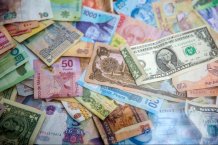Articles

Despite much rhetoric and progress on paper, the UK remains a safe haven for dirty money, a great deal of which comes from Russia and Eurasia.
Report: UK professions supporting ‘laundering of money & reputations’ of post-Soviet elite
Elite individuals from post-Soviet states are laundering their wealth and reputations in the UK, knowingly and willingly supported by a network of British professions, new research claims.
Despite much rhetoric and progress on paper, the UK remains a safe haven for dirty money, a great deal of which comes from Russia and Eurasia. Failure to tackle this thriving billion-dollar industry is “materially and reputationally damaging for the UK’s rule of law and to the UK’s professed role as an opponent of international corruption”, the report says and it calls for a new anti-kleptocracy strategy on the part of the British state.
The report by Chatham House’s Russia and Eurasia programme and authored by a team including Professor John Heathershaw from the University of Exeter, says that loopholes exploited in the service of kleptocrats and their associates, have eroded the legal system’s capacity to assess corruption risk, and has “transplanted authoritarian agendas and rivalries to UK settings, and undermined the integrity of important domestic institutions.”
British lawyers, estate agents and wealth managers “are not merely responding to a legitimate demand for legal services but generating that demand through their participation in a vibrant commercial market servicing the proceeds of kleptocracy,” the authors say.
Failure by both financial and non-financial institutions to undertake effective due diligence or apply proper ‘risk based’ approach, is giving these oligarchs and individuals to easy access to and influence on British society, it says.
This enabling occurs not just through huge property and other investment but through philanthropy to British universities and institutions coupled with aggressive public relations campaigns and litigation actions to ‘clean up their reputations’. The individuals, many of them from former USSR republics such as Azerbaijan, Kazakhstan, Ukraine and Uzbekistan widely use libel actions, cease and desist orders, PR agents, private intelligence and surveillance companies against journalists and investigators.
In addition to naming individuals and case studies, the report singles out the UK Conservative party over its disproportionate and increasing number of donations saying it suggests that it “may be open to influence from wealthy donors who originate from post-Soviet kleptocracies, and who may retain fealty to these regimes.”
They say the global community and the UK specifically need to adopt a new approach if they are serious about tackling the threat posed by the presence of kleptocrats, their associates and their financial flows. They have outlined a nine-point anti-kleptocracy strategy with recommendations.
“The UK has a long road ahead if it wants to address some of the damage caused by its servicing of post-Soviet elites and addiction to the suspicious capital that flows into the country in its billions.
“Now is the time for the UK government to acknowledge these risks and to address them with a coherent strategy.”
Date: 9 December 2021
